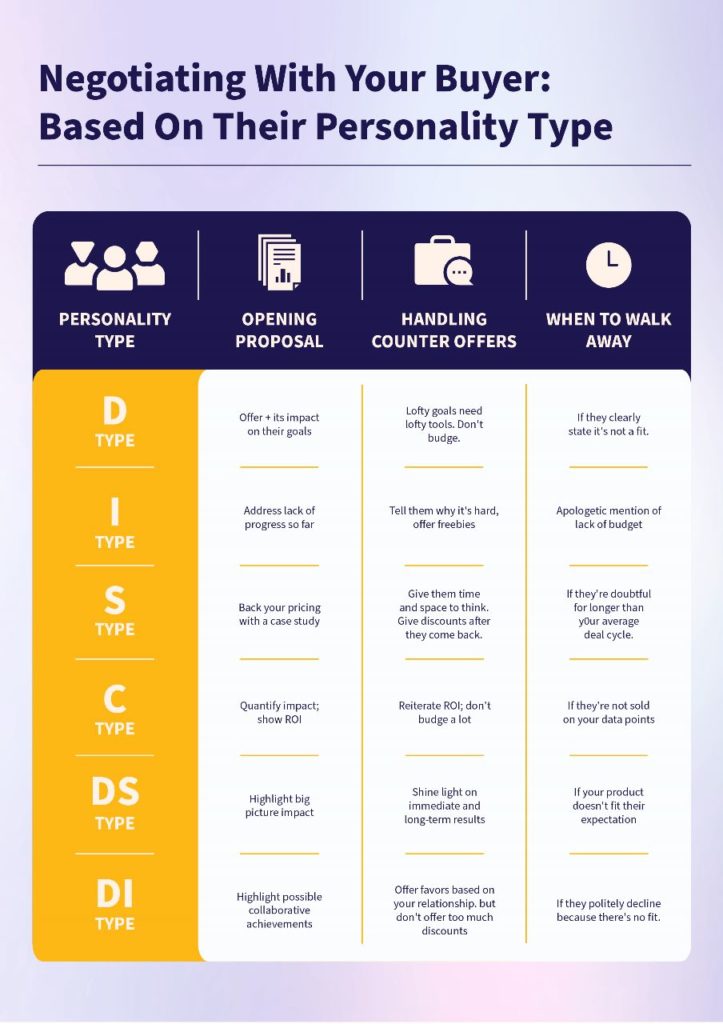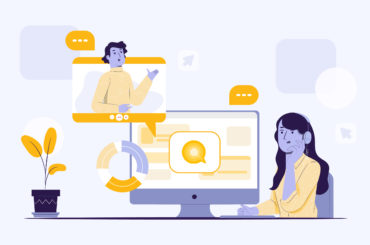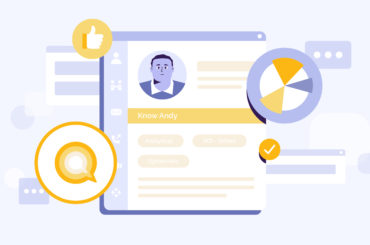Before we go into negotiation and using personality AI, I want you to take a step back. Think of your days at high school. There was always this one kid who got everything that he wanted. He had a way with words and would come out of conversations where everyone thought they had ‘won’. And you wonder “How does he do that?”
Well, he was probably a good negotiator. And if he made the right choices in life, he would be a salesperson today 🙂
You can identify someone like that when they’re able to negotiate with anyone and come out with solutions that are acceptable to all parties. In fact, more than acceptable, it’s justifiable.
Negotiation is risky business. Imagine losing potential customers that could have helped you close your quarter on a high, just because you refused to meet them halfway. It happens often. Every buyer is different – some might respond well to your negotiation tactics, and sometimes, you may end up pushing them away.
But the underlying fact to win a negotiation is to understand the counterpart and make them feel like winners too.
Related: Professor Guiseppe on using dual vision to succeed at sales negotiation.
In this article, let’s look at how to bring on your A game and close deals by understanding the personality of your counterpart!
Negotiate Like a Pro: The Basics
Every salesperson has a checklist of dos and don’ts to follow. This helps guide the conversation effectively and increases chances of conversion. Here are few tips and tricks to have up your sleeve the next time you want to convince a prospect into making a purchase:
- Lend a ear and build trust
- Provide value – twist the knife where you need to
- Have clear idea on upper and lower limits
- Lead where you need to and back off where you should
- Reflect on past negotiations and learn from it
Important note: Salespeople have a tendency to jump in with offers of discounts to entice the customer into an impulse purchase. It’s a bad idea. If they expect too high and they refuse to budge, it might be best to let the deal go. You don’t want to make more revenue at the cost of the business taking a loss.
Remember: You don’t need to close every deal. Increasing your bottom line at the cost of your top line is a no-no.
Advanced Skill: Being Emotionally Intelligent
Sales leaders are constantly looking for effective methods to help them stay on top of the game. With such cut-throat competition, you’ll need to spice your strategy up with a sure-fire solution. That’s where personality comes in.
Being emotionally intelligent and knowing your buyer inside out can help you tailor your negotiation to their preferred style. This way, you know what works for them and what throws them off. How to start a proposal, how to handle counter-offers, how to handle prolonged silence and when to walk away.
Let’s take some examples to see how to do that for different prospects.
Negotiating with Rand Fishkin Using Personality
Say you’ve got Rand Fishkin, CEO of SparkToro, on a review call with you, a couple of weeks after your discovery. Since CEOs are on tight schedules, you cut to the chase, and jump to talking about your product and how it can help the company. When Rand asks you about pricing, you give him an in-depth explanation of the various plans available. Despite seeming interested at first, he politely declines your offer.
What went wrong? Let’s run his profile through Humantic AI’s Personality Assistant and find out.
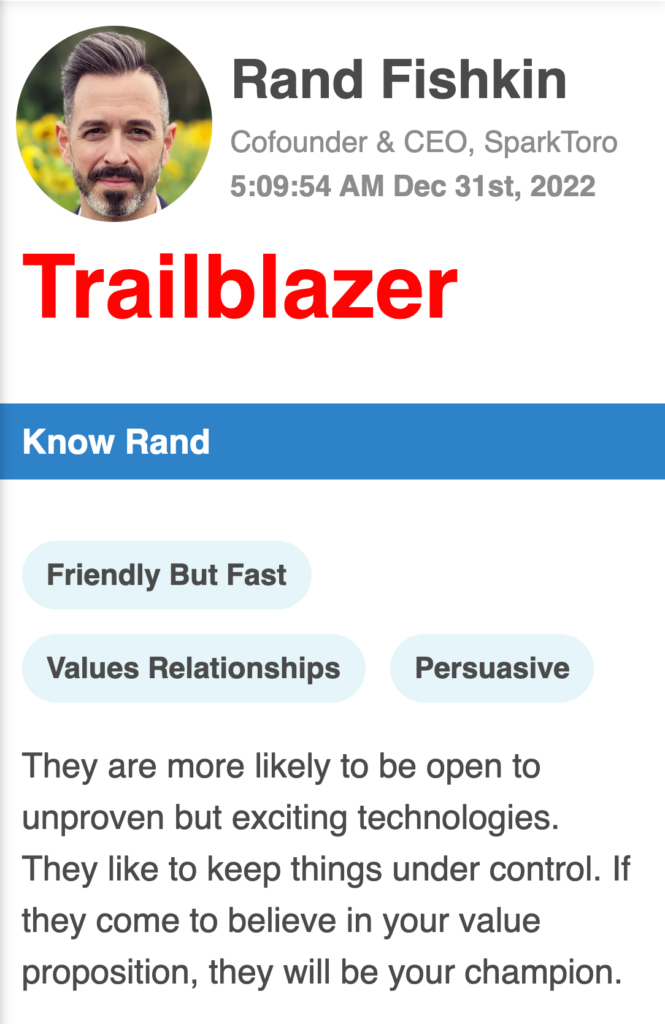
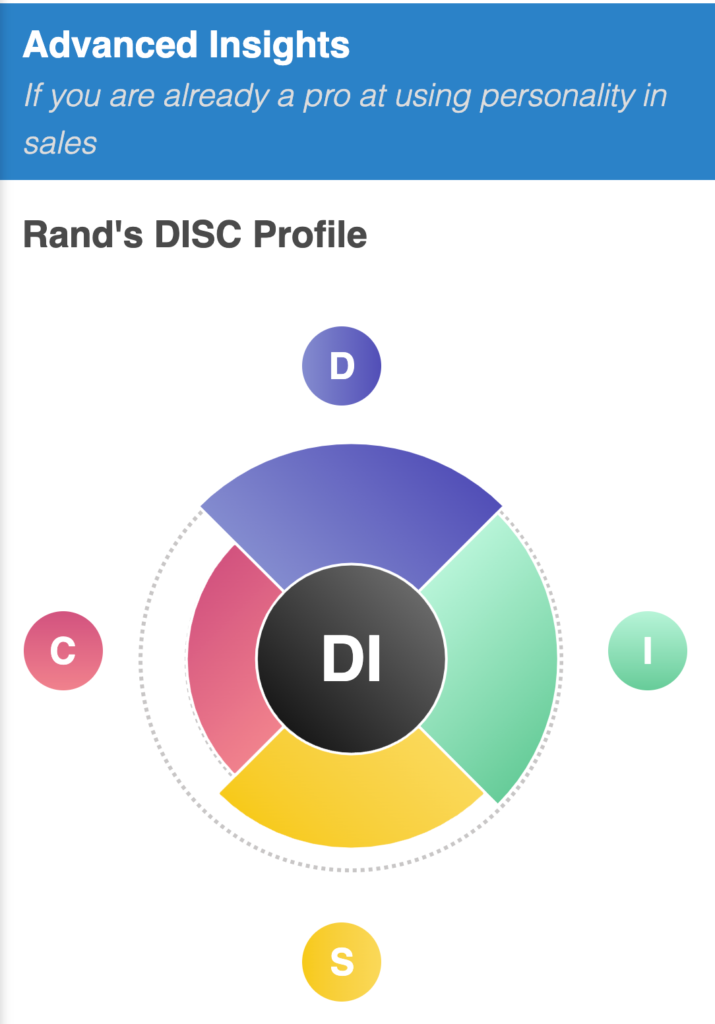
From the results, you can see that Rand is a DI type, also known as the initiator. He’s friendly, outgoing and prioritizes relationship-building during an interaction. If you had this information beforehand, you would have started the conversation with pleasantries instead of diving right into the product details. This would have given Randy an opportunity to understand you better, thus starting you off on the right foot.
Now, this is just the tip of the iceberg. Humantic AI goes on to tell us that product conviction and relationship matters equally to him.
So, we now know that small talk alone won’t cut it. We’ve got to convince him that this product can provide real value to his company. A better approach would probably look like this:
Randy, I know that you’re looking to enhance your company’s market research capabilities. You probably have at least one firm showing up in your inbox asking if you need secondary research, right? Though that’s probably not the case for user surveys and focus groups. I just wanted to understand if you’re looking to expand your team to focus on quantitative research as well.
By saying this in a disarming tone, you’re showing Randy that you have clearly understood his business problem and you’re working with him to reach a solution. Not only will this increase his trust in you, but he’ll slowly get more amicable as the conversation progresses, provided you keep asking the right questions.
Once you get a clear idea of how your product can amplify the operational efficiency of his company, you can go for the kill by talking about your offering.
I totally understand your problem. In fact, I could show you the stats, the ROI we bring, or shoot over a case study or two. But before I let you go, I want to show you what some of our customers have to say. Here’s one where a market research associate is all praise for their leadership for onboarding us. I’m sure enabling your team is a priority for you as well.
This shows Randy:
- How effective your product is
- Social proof
- The desire for collaboration, rather than simply selling
If all is good so far, let’s say Andy balks at the price you quote and asks for a discount. You can frame your counter-offer like this:
I’ve had such a great time speaking with you, Rand, but I really can’t go below $X. Employee satisfaction is priceless. I’d say $X is already a massive discount! (pause) If you still have some concerns, how about we grab a quick coffee and work it out together?
Randy is already convinced that your product is helpful to him, so chances are he’ll agree to an in-person meeting. You can use this to your advantage and create a friendly atmosphere before you wrap up the meeting with a small nudge in the right direction.
Let’s look at another example.
Negotiating with Jared Robin Using Personality
Now that you’ve seen how we broke down negotiation tactics based on Randy’s personality, let’s apply the same principle to Jared’s and see how we can negotiate with him better.
As Humantic shows, Jared has a Commander personality. People with ‘D-type personality’ are often impact-driven and care a lot about the product. Not so much the small talk or extra fluff.
While Both Randy and Jared have high D scores, they differ greatly from each other.
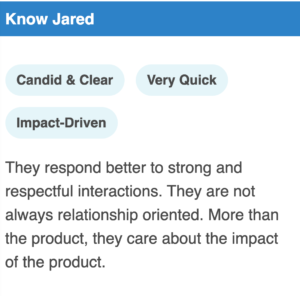
While starting a negotiation conversation with Jared be sure to understand what his goals are. Jared really needs conviction on the impact that the product can bring to him. So if at any point he feels that the product is not going to solve the problem, he will walk away. As his Humantic profile says, he’s not the type to take too many risks.
If he pushes back, make sure you give him confidence by talking about how your product can help him achieve anything. How your product helps his mission. Say something like “Hey Jared, sales leaders like you often face this challenge but having our product by your side, your team will be able to hit their target.”
Jared tends to take his decisions very quickly too. So if he isn’t convinced and tells you that within the first few meetings, chances are that he might never change his mind.
Every person likes to be sold to in a different way and top sales people understand that the key to unlocking a successful negotiation is to sell to the personality of the counterpart.
Closing notes on negotiation using personality
Think of that kid from your high school again. He probably understood this and that’s why he could do all that.
You can do that with Humantic’s chrome extension which accurately predicts personality and tells you what you need to focus on at different stages of a deal. So you can negotiate with confidence and get a win-win situation for all parties involved. Just like that kid.
BONUS: Ultimate Cheat-sheet To Negotiate With Your Buyer Using Personality
